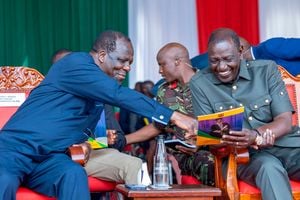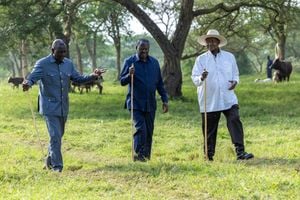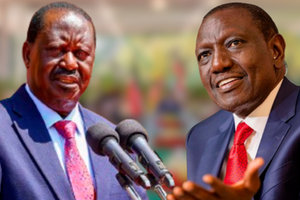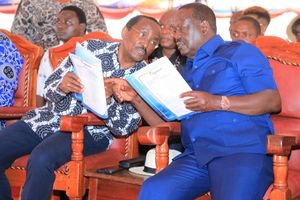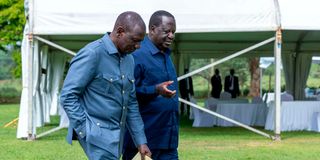
President William Ruto and former Prime Minister Raila Odinga.
The current unwritten political deal between President William Ruto and ODM leader Raila Odinga that is largely based on trust appears has stirred questions in a political landscape littered with trashed signed Memorandums of Understanding (MoUs).
Mr Odinga has four of his key allies sitting in the Cabinet but has insisted he has not entered into any political agreement with President Ruto’s UDA, insisting his ODM party remains in the opposition.
It is the second time in recent years that Mr Odinga is having such a deal without having any known signed documents or official agreement deposited with the Office of the Registrar of Political Parties.
In his March 9, 2018 famous handshake with then President Uhuru Kenyatta, the two parties — Jubilee and ODM— did not formalise their deal until in the run up to the 2022 General Election when they partnered in forming Azimio La Umoja One Kenya Coalition that fronted Mr Odinga as its presidential candidate. The handshake, however, gave raise to the Building Bridges Initiative reforms push that eventually failed to take off.
In the past, most of the political deals were formalised through written agreements. For instance, when Mr Odinga entered a deal with the independence party Kanu in 2002, he merged his National Development Party (NDP) and became the new Kanu Secretary General. Three NDP MPs, including Mr Odinga also joined the Cabinet.
But just like other several written political deals, Mr Odinga walked out of Kanu in the run up to 2002 General Elections. Mr Odinga had expected to win the endorsement of then President Daniel Moi for his presidential bid. President Moi, however, opted to back Uhuru Kenyatta, a political greenhorn, leaving Mr Odinga and other Kanu stalwarts disgruntled.
Since then the country’s political scene continues to be littered with broken promises and dashed MoUs, but the jury is still out on unwritten “gentleman’s agreements”.
“Written deals are political conmanship. They are based on coercion and lack of trust. Because you don’t trust each other, you insist on signing documents and depositing with a third party as security,” says Kimilili MP Didmus Barasa.
“Gentleman’s agreement is based on trust and understanding of mutual interests and benefits. Whatever we need to do with the support of ODM does not require support of any law,” he adds.
Prof David Monda, a university lecturer and political analyst, said informal political deals are becoming more viable than written MoUs because the political players of pre-election deals have shown no intention of sticking by the agreements.
“Depending on the outcome of the election, major political players gain more from abandoning the MOUs, which place minor players in political coalitions with little chance of keeping the original MoU in place. There is an asymmetrical relationship in the different players that form pre-election MOUs. Not all parties are equal. Raila-Kalonzo-Martha's association is indicative of this,” says Prof Monda, who teaches at City University of New York.
In the run up to the 2022 General Election, ANC leader Musalia Mudavadi (now Prime Cabinet Secretary and Foreign minister) and Ford Kenya leader Moses Wetang’ula (now National Assembly Speaker) negotiated a 30 per cent stake in government.
President Ruto handed them their current positions on the basis of the agreement. There is, however, a debate on whether the 30 per cent share of government was met or not.
It was the same case for Maendeleo Chap Chap of Labour Cabinet Secretary Alfred Mutua and Chama Cha Kazi of former Public Service CS Moses Kuria. Mr Kuria was sacked from the Cabinet — then offered a soft landing in a State House role — in what has once again exposed written political agreement as fluid and with no legal enforcement provisions.
“Written MoUs have instruments deposited with the registrar of parties but cannot be legally enforced. MoUs have continued to be disregarded after elections. I think those running for the presidency enter them to win the support of their partners’ political backyards,” says Kakamega Deputy Governor Ayub Savula.
He adds: “This other one is based on trust and the political goodwill of the person in power. Situation forced Ruto to bring Raila on board. It is in his interest to have Raila in.”
Prof Monda says another factor leading to an increase in informal political deals is the shifting sands of the pre- and post-election environments. He describes Kenyan politics as dynamic, ruthless and unforgiving.
“It is therefore incumbent on political players to regularly revisit their political interests. Written MoUs tend not to keep pace with the rapidly changing dynamics of post-election scenarios. The Gen Z movement is an example of how sudden intense social movements can upend the political apple cart. The multiparty wave in the 1990s is another as was the anti-KANU wave of 2002,” he says.
The long love/hate relationship since 2002 between Raila/Kibaki, Raila/Uhuru, Uhuru/Ruto, or Raila/Ruto, for example, tends to make binding MoUs inconvenient and stifling, explains Prof Monda.
In the current informal deal, Mr Odinga’s elder brother, Oburu Oginga, former Jubilee Secretary General Raphael Tuju, Minority Whip Junet Mohammed, Mr Odinga’s long-time confidante Mr Joe Ager and Prof Adams Oloo were part of the team that brokered the broad-based government designed as a way out of the nationwide youth protests which threatened to collapse Kenya Kwanza administration.
Most of the meetings were informally held, some reportedly taking place at night at Mr Tuju’s restaurant in Karen while others were held at Jaramogi Oginga Odinga Foundation (JOOF). Nation.Africa has, however, established that some of the negotiations were documented, but were not deposited with a third party like in the case of formal political agreements.
ODM national chairperson Gladys Wanga told Nation Africa that there were no plans to formalise any deal between the Orange party and UDA.
Ms Wanga, who is also the Homa Bay governor, said ODM remains in the opposition Azimio coalition and will continue with its oversight role.
“We have no formal agreement with UDA. Some of our officials were tapped to join the government but ODM remains in the opposition and will continue discharging its oversight duties as usual. Our members joined the government because of the circumstances known by all Kenyans. The country was going down and we had an obligation to rescue it,” said Ms Wanga.
Apart from the broken MoU between Kanu and NDP, Mr Odinga has in the past suffered a string of political betrayals after written pre-election deals were trashed. When he bolted out of Kanu in the run up to the 2002 poll, he formed Liberal Democratic Party (LDP) that teamed up with National Alliance Party of Kenya (NAK) in forming National Rainbow Coalition (NARC) that swept Mwai Kibaki to the presidency.
The two sides signed a MoU that stipulated the sharing of Cabinet slots. There was also a written agreement to make Mr Odinga the Prime Minister after amending the constitution within 90 days after election. This was, however, reneged on.
In a past interview with Nation, then powerful Kibaki’s private secretary and State House Controller Matere Keriri said honouring some of the agreements would have occasioned anarchy in government. He said it would have created a situation where ministers would have their loyalty in different people.
“No one broke the MoU. The Cabinet slots were shared as agreed. Then there was the matter of Raila being appointed Prime Minister. The constitution said the appointment of ministers is strictly the job of the President. But the MoU had said Raila will propose his line-up of ministers, Kalonzo his ministers and Kibaki his ministers,” said Mr Keriri.
He added: “But come to think of it, what kind of a government would it be if all ministers had their loyalty to different people. It would have been anarchy, so President Kibaki had to think about what to do.”
Similarly, at the height of the 2007/2008 post-election violence, Mr Kalonzo Musyoka, then ODM-Kenya leader, entered a deal with then President Kibaki.
Mr Kibaki, who had controversially won the presidential election whose results were disputed by his main rival, Mr Odinga, reached out to Mr Musyoka to boost his legitimacy. Then Minister for Internal Security John Michuki, who represented Kibaki and Amos Kimunya represented Mr Kibaki while Johnstone Muthama and David Musila represented Mr Musyoka in drawing a deal.
In a previous interview, Mr Muthama said that apart from sharing Cabinet portfolios Mr Kibaki was to back Mr Musyoka in the 2013 succession election. This agreement was not honored.
Mr Mudavadi has equally suffered political betrayal. In the run up to the 2013 polls, Dr Ruto and Mr Kenyatta, because of their then criminal charges at the International Criminal Court (ICC) agreed to shelve their presidential bid to back Mr Mudavadi.
Mr Kenyatta and Dr Ruto are said to have even gone to Mr Mudavadi’s Nairobi’s Riverside Drive to seal the MoU. Mr Kenyatta would later reject the deal, describing it as the work of madimoni “dark forces”. The ill-fated MoU was titled “The Agreement between Uhuru Muigai Kenyatta and Wycliffe Musalia Mudavadi”

